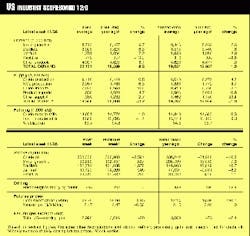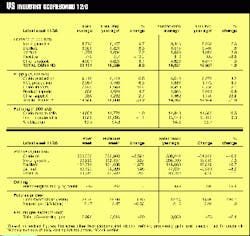OGJ Newsletter
Topping the radar screen for skittish oil markets this week are the Y2K bug and Saddam Hussein.
In hopes of injecting confidence in oil market stability at a time when oil prices are already high and poised to rise further, some key oil exporters are offering reassurance to consuming nations-already nervous about the likely upward trajectory of oil prices this winter-that the Y2K rollover will not disrupt global oil supplies. What's noteworthy is that these three exporters are the countries that masterminded the rounds of production cuts that have boosted oil prices to their current levels. Saudi Arabia, Venezuela, and Mexico say they stand ready to make up for any supply shortfall resulting from the computer glitch threat. While contending their own production is not at risk, the three said in a joint statement that they would coordinate efforts with other producing nations to boost output to offset a possible supply disruption.
IEA chief Robert Priddle praised the initiative as "statesmanlike" and marking a "significant contribution to maintaining confidence in oil markets."
US DOE has chimed in with its own reassurance regarding a possible Y2K bug-related oil supply disruption. DOE acknowledges having a contingency plan in place to auction SPR oil if there are shortages in January due to the Y2K glitch. However, DOE continues to insist it does not intend to sell SPR oil simply in response to rising world oil prices. Before Congress recessed last month, Sens. Charles Schumer (D-NY) and Susan Collins (R-Me.) filed a bill providing for SPR sales to counter rising prices resulting from production cuts.
From an unlikely source comes more reassurance for stable oil markets this winter: Iraq says it will study the next 6-month extension of the oil-for-aid sales program overseen by the UN, when that extension proposal comes before it.
Baghdad late last month halted oil exports in a fit of pique over the UN extending the latest phase of the program another 2 weeks to give Security Council members more time to debate conditions for permanently lifting sanctions on Iraq. The sales halt rocketed oil prices to their highest level since the Persian Gulf crisis of 1990 and spurred widespread fears that Iraq's 2 million b/d of exports might be kept off the market for a protracted period-likely triggering a much-more severe crisis than any linked to a computer glitch (see Watching the World, p. 40, and OGJ, Nov. 29, 1999, Newsletter). Under the UN program, Iraq is allowed to sell $5.26 billion worth of oil every 6 months to buy food, medicine, and spare parts for its bedraggled oil sector.
Speaking of sanctions, more firms scoff at US sanctions targeting investment in Iran's oil sector and rush in to fill the void left by banned US firms (see Editorial, p. 23). Germany's Veba Oil is the latest European firm to join the Iranian investment bandwagon, signing an accord with Iran's petroleum ministry to participate in a South Caspian exploration study that National Iranian Oil Co. launched a year ago in partnership with Royal Dutch/Shell and Lasmo.
That earlier accord called for spending up to $25 million on the first phase of an exploration program off Iran's southern Caspian coast (OGJ, Nov. 22, 1999, p. 33). Other companies have also expressed an interest in the program, says NIOC, even though 80% of the work is complete.
The initial phase is slated for 18 months but could be extended to 24. The interests will be NIOC, Shell, and Lasmo, 28.33% each, and Veba, 15%.
Indian Oil Corp. plans to acquire about a 35% stake in the Balal oil field development project led by Elf. The Reserve Bank of India has cleared the $15 million investment proposal to allow IOC to acquire the interest. IOC says the deal would tie up 80,000 b/d of Iranian oil for the Indian firm for an initial 5 years; the firm will decide whether to extend its participation further when the field starts production. IOC has had preliminary talks with Elf and plans to finalize the deal in Iran soon. IOC had a previous agreement in principle with London independent Premier Oil, which sold its stake to Elf.
Development work is expected to get under way soon.
Market uncertainty is delaying two world-class natural gas-based projects while a third may be budding. Peru has postponed, to early 2000, deadlines to present bids for the Camisea natural gas concessions a third time since calling the tenders in mid-1999 (OGJ, Oct. 4, 1999, Newsletter). Bids to transport and distribute Camisea-produced gas and liquids will be presented Jan. 25, while bids for the contract to develop Camisea gas and condensate reserves are due on Feb. 15. The Camisea committee has been unable to convince potential gas customers, mainly power plants, to sign take-or-pay contracts for Camisea gas.
Pakistan's plans to import gas from Turkmenistan, Iran, and Qatar have been put on hold due to a recent string of big gas discoveries in the country.
Gas found recently at Bhit, Sawan, and Zamzama have caused the Pakistani government to rethink its intentions to import supplies from these countries. Pakistan's total estimated gas reserves stand at 25 tcf, about 20 years' worth at the projected rate of production.
Meanwhile, Petro-Canada is reportedly in negotiations with Sonatrach centering on development of giant Tamadnite gas field in Southeast Algeria.
After proving up as much as 1.9 tcf in gas reserves there, Petro-Canada has allocated nearly $35 million for further exploration activity in the area. The project is thought to include the construction of gas-treatment plants and pipelines to export gas via the Mediterranean Sea. Petro-Canada hopes to expand activities to include other recently discovered fields on its concession.
Norway is poised to overtake the UK as the largest North Sea oil and gas producer, says Mackay Consultants.
In Mackay's study, which looks at North Sea prospects through 2003, the Scottish consultant envisions 2000 or 2001 as years that are likely to be the "turning point" in the sector's history. This is also the time when Norway will overtake the UK as top overall hydrocarbons producer (see related story, p. 25).
Total offshore North Sea spending, according to the report, will decline to $27 billion in 2000, or 20% less than expenditures seen in 1998. Also, North Sea oil production will peak at 331.6 million tonnes in 2000 and then decline to 300 million tonnes in 2003, the report says.
Another deepwater drilling record falls. The Petrobras-operated, R&B Falcon-owned Peregrine 4 Deepwater Expedition drillship spudded a well in 9,111 ft of water off Brazil Nov. 29, setting the record, reports ABB Offshore Systems, creator of the ship's drilling control system.
The US oil and gas industry isn't waiting for a final verdict in the scientific debate over postulated catastrophic global warming. Industry is taking an active role through voluntary programs and various new technologies to cut greenhouse gas emissions, API Pres. Red Cavaney last week told a Houston conference that was a showcase for such initiatives.
Cavaney notes, however, that most of the US oil industry remains strongly opposed to the Kyoto Protocol-which mandates steep cuts in developed countries' greenhouse gas emissions-because such cuts would damage the US economy and the protocol excludes developing country participation.
Still, he said, "Unquestionably, there will continue to be much debate over the Kyoto Protocol throughout next year and beyond. Howeverellipseefforts to address climate, including collaboration with the (US) government and a host of other research initiatives, are proceeding despite differences over Kyoto."
Australia's struggling refining sector is again looking at mergers as a means of dealing with perpetually low margins and increasing competition from Asian products imports. The country's four major refiners were negotiating to form two joint ventures early this year, but plans for the BP Australia-Caltex Australia and Shell Australia-Mobil Oil Australia mergers were later called off (OGJ, Mar. 8, 1999, Newsletter). The four firms met individually with Australian Competition and Consumer Commission (ACCC) Chairman Alan Fels the past 2 months. Talks reportedly centered on the difficult operating environment and the huge expenditures needed to update refineries to meet pending changes in fuel standards. The meetings coincide with reports that the majors have won cautious federal government support to rationalize the downstream industry-a move expected to include the closure of two or more refineries. Shell has already said its Clyde refinery is not a long-term fixture (see story p. 38).
The government reportedly will consider backing mergers on a case-by-case basis, following an industry submission that says major restructuring is needed to prevent plant closures and massive job losses. The federal cabinet supports industry's plan, following commitments from the four majors to invest the $1 billion (Aus.) or more in revamps needed to meet the "clean fuel" regime.

